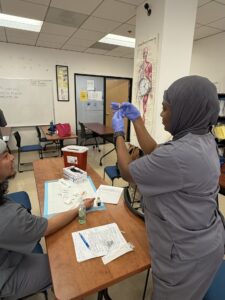We offer Medical Assisting classes year-round, so you can start when it’s convenient for you. Learn more about our program today!
Class Calendar | Call admissions on 415-943-2028
Find Phlebotomy Technician and EKG Technician training at BAMA Institute
Class Calendar | Call admissions on 415-943-2028

In today’s fast-paced healthcare environment, technical skills alone aren’t enough. To truly succeed, a medical assistant must also possess strong emotional intelligence (EI). Emotional intelligence—the ability to recognize, understand, and manage emotions—plays a vital role in patient care, team communication, and professional growth.
Let’s explore why emotional intelligence is such a crucial asset for every medical assistant and how it can make the difference between simply doing the job and excelling at it.
Patients are often nervous, in pain, or confused when they visit a healthcare facility. A medical assistant with high emotional intelligence can recognize these feelings and respond with empathy and compassion. This helps create a calming environment, which builds trust and improves the overall patient experience.
By showing genuine concern and practicing active listening, medical assistants not only make patients feel heard—they also improve communication between patients and providers. That trust can lead to more accurate medical histories, better treatment outcomes, and higher patient satisfaction scores.
While some emotional intelligence comes naturally, medical assisting school plays a crucial role in helping students build and refine these skills. Through hands-on simulations, patient roleplaying, and real-world externships, students learn how to recognize and respond to emotional cues in a clinical setting. Coursework often includes communication strategies, professionalism, and patient interaction scenarios—giving future medical assistants the tools they need to navigate emotional situations with confidence and empathy. These lessons prepare students not only to perform their duties, but to do so with compassion and emotional awareness.
A medical assistant works alongside doctors, nurses, and other staff members in high-pressure situations. Emotional intelligence helps professionals communicate clearly, resolve conflicts respectfully, and adapt quickly to changing priorities. Understanding how to interpret body language, tone of voice, and emotional cues can prevent misunderstandings and reduce workplace stress.
Medical assistants with strong emotional awareness are also better equipped to receive feedback, take initiative, and work well under supervision—all traits that are highly valued in clinical settings.
Emotional intelligence doesn’t just benefit patients and teams—it also supports the medical assistant’s well-being. When professionals manage their emotions effectively, they are less likely to experience burnout, compassion fatigue, or job-related anxiety. High EI leads to greater resilience, which is especially important in a role that often requires multitasking, problem-solving, and emotional labor.
In fact, many employers now seek candidates who demonstrate strong interpersonal skills in addition to technical expertise. Developing emotional intelligence can open doors to leadership roles, advanced certifications, and long-term career growth.
Every medical assistant wants to make a positive impact in their workplace. Emotional intelligence enhances clinical performance by improving communication, strengthening relationships, and promoting empathy-driven care. It also makes you a more adaptable, dependable, and valuable member of any healthcare team.
Whether you’re interacting with patients, assisting physicians, or managing administrative duties, emotional intelligence helps you stay calm, focused, and professional in any situation.
If you’re inspired to build a meaningful healthcare career that blends technical skills, patient care, and emotional intelligence, Bay Area Medical Academy’s 3-in-1 medical assisting with phlebotomy program is the perfect place to start. You’ll receive hands-on training in medical assisting, phlebotomy, and EKG—all designed to prepare you for real-world success in just months.
Contact our admissions team today to learn more about program start dates, financial aid options, and how you can take the first step toward becoming a certified medical assistant. Your future in healthcare starts now!
"*" indicates required fields
Our career-oriented program gives you hands-on, real-world training and ongoing support for your long-term goals.
For more information on BAMA's medical assisting and phlebotomy degree programs, contact us today!
BAMA: The Bay Area's best career-oriented healthcare traning
© 2024 Bay Area Medical Academy. All Rights Reserved. Website by WindsAndWater